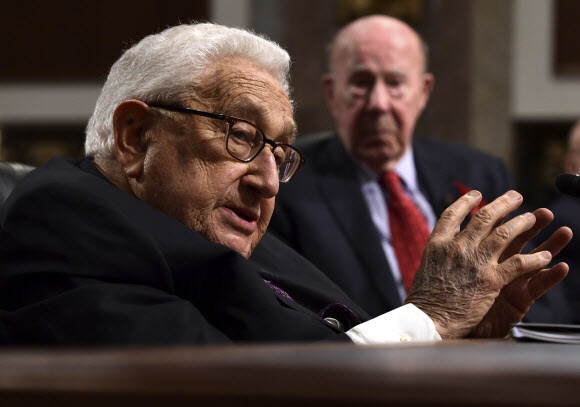hankyoreh
Links to other country sites 다른 나라 사이트 링크
[Editorial] US showing signs of shifting to dialogue with North Korea

Since North Korea announced its participation in the Pyeongchang Winter Olympics, various figures in the US have been talking about a diplomatic solution to the North Korean nuclear issue. Most notable are the comments by former Secretary of State Henry Kissinger about restarting the Six Party Talks. On Jan. 25, Kissinger said that the best way to reach an agreement on the denuclearization of the Korean Peninsula was by reviving the original Six Party Talks.
That’s considerably different from the hardline policy toward North Korea that he delineated last year, when he said that the US and China should have an agreement about how to deal with the collapse of the North Korean regime. Coming from a figure who has influence over the foreign policy of the Trump administration, such remarks make one feel once again that the mood in the US is shifting away from the fixation on pressure and toward opening the door to dialogue.
The Six Party Talks were launched in 2003 with the aim of finding a solution to the North Korean nuclear issue. They achieved considerable results through 2007, but they were suspended amid conflict between North Korea and the US and have not been reopened since then. But given how the conflict between the US and North Korea has become intense, turning into a veritable tinderbox, resuming the Six Party Talks between South and North Korea and their four powerful neighbors could serve as a safety mechanism and promote dialogue between North Korea and the US.
Even if the Six Party Talks are not reopened immediately, merely creating a venue for dialogue between the US and North Korea by discussing the idea of reopening the talks would be of no small significance. In connection with this, Robert Gallucci (the former US State Department envoy for the North Korean nuclear program and the chief US negotiator behind the US and North Korea’s Agreed Framework in 1994) recently offered some thought-provoking advice. Gallucci said that this was not a bad time for the US to engage with North Korea and that even dialogue for dialogue’s sake would be acceptable if it helped ease tensions on the Korean Peninsula.
We hope that officials in the Trump administration will lend their ear to such proposals by veteran diplomats who personally dealt with East Asian affairs and the North Korean nuclear issue. The South Korean government must also devote even more energy to serving as a facilitator for US-North Korea dialogue, so that these efforts can bear fruit.
The central question is the extent to which the US and North Korea can understand each other and make concessions. In that sense, it’s unfortunate that the US State Department categorically stated it would resume military exercises with South Korea immediately after the closing ceremony of the Olympics. We’re concerned that the push for peace that has materialized after so long will have to start from scratch.
Downsizing or further delaying the exercises would be a better way to gain trust with North Korea. Pyongyang’s decision to hold a large-scale military parade the day before the opening ceremony of the Olympics is not wise, either. What is needed right now is for North Korea and the US to both take a step back and move toward genuine dialogue.
Please direct questions or comments to [english@hani.co.kr]

Editorial・opinion
![[Column] Season 2 of special prosecutor probe may be coming to Korea soon [Column] Season 2 of special prosecutor probe may be coming to Korea soon](https://flexible.img.hani.co.kr/flexible/normal/500/300/imgdb/original/2024/0426/3317141030699447.jpg) [Column] Season 2 of special prosecutor probe may be coming to Korea soon
[Column] Season 2 of special prosecutor probe may be coming to Korea soon![[Column] Park Geun-hye déjà vu in Yoon Suk-yeol [Column] Park Geun-hye déjà vu in Yoon Suk-yeol](https://flexible.img.hani.co.kr/flexible/normal/500/300/imgdb/original/2024/0424/651713945113788.jpg) [Column] Park Geun-hye déjà vu in Yoon Suk-yeol
[Column] Park Geun-hye déjà vu in Yoon Suk-yeol- [Editorial] New weight of N. Korea’s nuclear threats makes dialogue all the more urgent
- [Guest essay] The real reason Korea’s new right wants to dub Rhee a founding father
- [Column] ‘Choson’: Is it time we start referring to N. Korea in its own terms?
- [Editorial] Japan’s rewriting of history with Korea has gone too far
- [Column] The president’s questionable capacity for dialogue
- [Column] Are chaebol firms just pizza pies for families to divvy up as they please?
- [Column] Has Korea, too, crossed the Rubicon on China?
- [Correspondent’s column] In Japan’s alliance with US, echoes of its past alliances with UK
Most viewed articles
- 1Samsung subcontractor worker commits suicide from work stress
- 2Division commander ordered troops to enter raging flood waters before Marine died, survivor says
- 3No good, very bad game for Korea puts it out of Olympics for first time since 1988
- 4‘We must say no’: Seoul defense chief on Korean, USFK involvement in hypothetical Taiwan crisis
- 5[Column] Season 2 of special prosecutor probe may be coming to Korea soon
- 6Is N. Korea threatening to test nukes in response to possible new US-led sanctions body?
- 7Korea’s 1.3% growth in Q1 signals ‘textbook’ return to growth, says government
- 8US overtakes China as Korea’s top export market, prompting trade sanction jitters
- 9[Column] Has Korea, too, crossed the Rubicon on China?
- 10[Column] ‘Choson’: Is it time we start referring to N. Korea in its own terms?